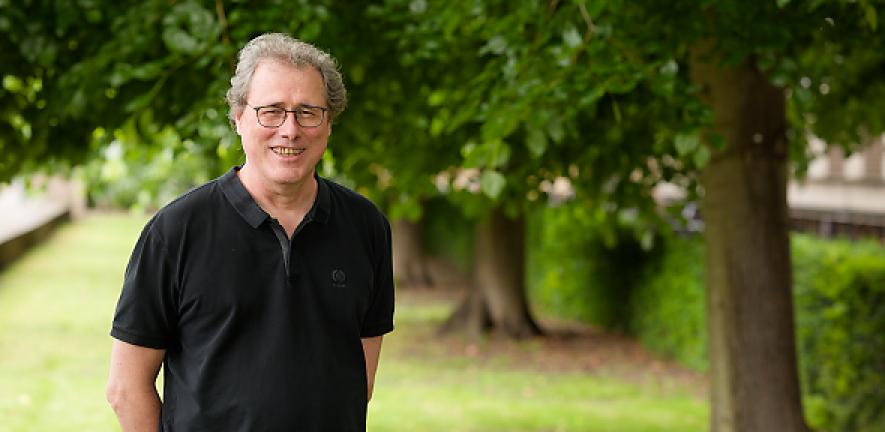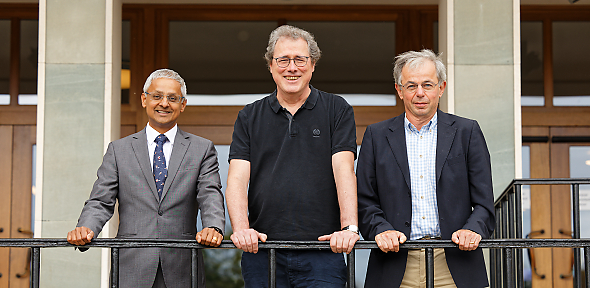
Dr Mayer recently visited the department for the first time, when we took the opportunity to find out more about him.
Growing up
I grew up in Stiring-Wendel, a small town in the mining region of Moselle, France. Many of my friends thought they’d make a career in mining, but I was aspiring to something different.
Interest in science
I first displayed my interest in science when I had an electric train at about age seven and dismantled the transformer to see what was inside! I’ve always been interested in complex systems and how they work and as a high school student I convinced my father to buy me a programmable TI 59 calculator, which I used to program a neural network. It was totally useless of course, but it helped me realise I wanted to study biophysics, which was the closest thing you could get to systems biology in those days.
University days
Nobody I knew had gone to physics at the University of Strasbourg, so it was intimidating when I started as undergraduate. I initially didn’t know anyone in my department and because it was not an integrative campus like here, I was at first mostly on my own. One funny thing is that the Sociology faculty was very demanding in linear algebra, so I got to know some sociology students when they asked me to help them. From that group of students, one became my wife.
‘Faire du bricolage’
I am happy to agree that I am a solutions guy and, when needed, I am also good at bricolage - what you call DIY. When I was doing my PhD at the Charles Sadron Institute (also in Strasbourg), the sophisticated optical measurement I was making was very sensitive to vibration but we didn’t have the budget to buy an anti-vibration table. So I put together a large concrete plant pot with a piece of granite from a tombstone merchant and an air mattress, which performed perfectly!
My role in the development of NGS
For my postdoc positions at the University of Ottawa and CNRS Paul Pascal Research Center I worked on electrophoresis-based DNA sequencing, which at the time was very cumbersome and time consuming, as well as innovative alternative methods. I wanted to find a better way.
When I joined the Glaxo Wellcome Institute of Biomedical Research in Geneva in 1996, I got its scientists interested in my idea of massively parallel DNA sequencing using surface-amplified microclusters of DNA, which I called DNA colonies. The work went well and the methodology we developed was patented in April 1997.
Meanwhile a biotech company called Serono (now Merck-Serono) took over the Institute and continued funding the project. We needed to develop the technology and its applications further to their full potential, so I convinced Serono to incorporate a spin-off called Manteia Predictive Medicine. This was funded for another two years, but in 2003 Serono’s senior management decided to cut costs and out went the funding. Serono sold the Manteia IP to David and Shankar’s company, Solexa, which gave them the final piece of the puzzle for their sequencing technology.
Alphanosos
Since then I’ve been involved in several start-ups, and in 2014 I co-founded Alphanosos, which uses AI algorithms of mine to guide the rapid discovery of safe, efficient and eco-responsible therapeutics, such as alternatives to traditional pharmaceutical antibiotics towards multi-resistant bacteria. We even developed an animal model validated anti-coronavirus therapeutic candidate in early 2021, but clinical validation and licensing are yet to be achieved.
Scientific entrepreneur
When I was in science at university I wanted to be an entrepreneur, and when I was working in business I wanted to be a scientist. So today I consider myself a scientific entrepreneur. For me, the motivation to start a company is to make a scientific breakthrough, and any breakthrough would not be in the mainstream of thinking. Alphanosos is not in the mainstream, but it has huge potential.
Honorary Chair
I felt very honoured to be awarded an Honorary Chair at the Institute for Advanced Study at the University of Strasbourg in 2023. It is an emotional feeling, because it was the university where I studied from undergrad to PhD. It’s very prestigious and motivating in the sense that it makes me feel like I’m joining back to the academic club, having been in the start-up world. It’s also opened many doors to new projects with people in Strasbourg.
The Breakthrough Prize and Canada Gairdner Award
I was very happy to be awarded these prizes of course. It was a very important step for me and all the people who worked beside me for all that time. I feel it validates my ideas and the work of everybody involved. It is an opportunity to shine light on what I like to call “the Geneva branch” of next generation sequencing.
Visiting Cambridge
I have never visited Cambridge before and what surprised me most is the historical atmosphere that comes out when you’re walking through the University. It places science on a historical time scale that you don’t see in industry or start-ups. This is a place that gives you the feeling that you are making science for history.
From left: Shankar Balasubramanian, Pascal Mayer and David Klenerman


